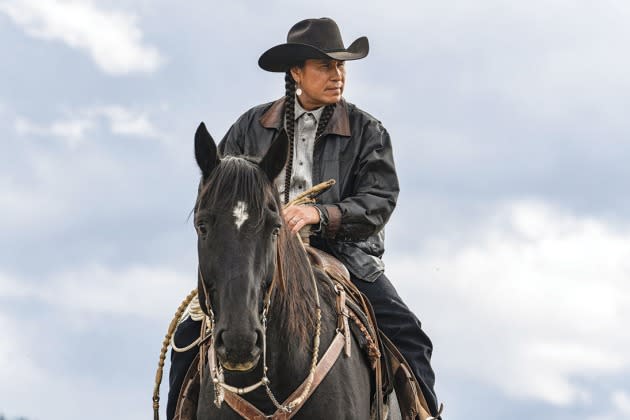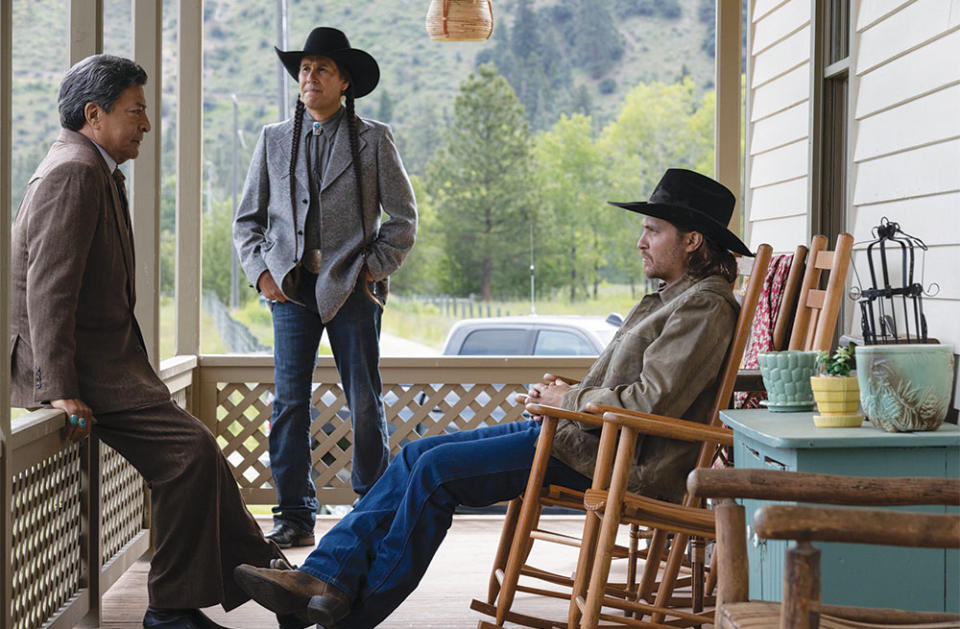‘Yellowstone’’s Mo Brings Plenty on Accurate Representation: “If I Can’t Get Support of That Tribe, I’m Failing at My Job”
- Oops!Something went wrong.Please try again later.

Mo Brings Plenty has openly said that he was ready to quit acting before Yellowstone came along. An enrolled member of the Lakota Nations, he was frustrated with the cultural misappropriation he saw onscreen, until he was cast in the first season of the Paramount Network flagship series that launched in 2018. As the right-hand man to Broken Rock Tribe chief Thomas Rainwater (played by Gil Birmingham), Mo (also the name of his character) began as a smaller role that expanded with each season of the Kevin Costner-led series created by Taylor Sheridan. But it’s from behind the scenes that Brings Plenty helps to provide a grassroots-level of authenticity to the franchise’s Native storylines — a rarity, he acknowledges, when it comes to representation onscreen. “If you want accuracy, then you have to come to a few of us. We’re not a dime a dozen anymore,” says Yellowstone‘s Native affairs coordinator, a role Brings Plenty took on for the currently airing fifth and final season (on the prequel series 1923, he serves as the American Indian affairs coordinator). “It’s a slow process, but I’m trying to change how everything is being done.”
How did your Yellowstone role transition from acting to consulting?
More from The Hollywood Reporter
How Colman Domingo's 'You Are Here' Is Flipping the Script on TV's Travel Genre
Netflix and NewFest Unveil 2023 New Voices Filmmaker Grant Recipients (Exclusive)
I acted on the first three seasons, but I assisted the individual who was the coordinator at the time [Daryl Begay] if he had any traditional questions regarding the culture. I have more grassroots connections. When he exited to pursue other things, that’s when the consulting [job] was offered to me for season five. He’s from a different tribe, but we want the best and we help each other out. Still today, if something comes up that I don’t know about, I can call on him.
In a 2022 New York Times profile, you spoke about how you were ready to quit acting before Yellowstone. How far into the success of the series did you realize you wouldn’t be giving up on acting anytime soon?
After the first season. That’s when I was truly able to exhale and be like, “OK, I don’t have to give up.” A lot of my frustration always resulted from casting directors. That’s where the misrepresentation for us began. Something I do in my consulting role now is when there’s a tribe represented [on the series], I visit and talk to the tribal council as my first step, and then to the community and the grassroots people. If I can’t get the support of that tribe, then I’m failing at my job. And then I feel like I’ve failed them. I always go to the people who have been through the trials and tribulations to keep the language and traditions alive, because I feel that they deserve that recognition and type of respect.
A big part of your role is making sure that Yellowstone and 1923 have fluent language speakers of any tribe being represented. What hesitations about the show have you encountered when going to bat for the franchise?
Everyone has been very supportive. Really for me, 1923 was the first one that no one really knew about. Everyone knows Yellowstone, so that was easy. We already have a great working relationship in the Flathead Reservation and with the Salish folks. That’s an easy connection already well-established. But 1923 was different. The Crow tribe was represented [with the story of Teonna Rainwater, played by Aminah Nieves]. I went to Crow Agency [the headquarters on the reservation] and had a few meetings with different people, and we got connected with Birdie Real Bird [1923‘s Crow language speaker and translator]. Birdie Real Bird is a traditional language speaker, fluent in speaking and writing. And that’s one of the great assets to being a part of helping our actors and actresses with the language.
What are some of the things you’re most proud of accomplishing in this role with Yellowstone and 1923?
I’m extremely proud of working with actors such as Aminah. Aminah understands that language is very valuable; it is priceless. Especially in this day and age, to find true fluent language speakers who can write it and even teach it — those individuals are unicorns. Those people are priceless. And she embraced that ability to indulge and allow herself to be vulnerable in a language, as well as Michael Spears [who plays Teonna’s father, Runs His Horse], Michael Greyeyes [who plays Hank] and Cole Brings Plenty [Mo’s nephew, who plays Hank’s son, Pete Plenty Clouds]. As American Indian people, our language is fading fast. And once our language is faded and gone, then our existence is gone.

Even more so than Yellowstone, 1923 devotes space to Native storylines on television. Do you feel like you are on the precipice of change?
I really feel that way. It’s all due to the support of Taylor Sheridan, 101 Studios and Paramount. To give us the opportunities to allow us to occupy the space that has been created for us, where in the past, there was a space, but the industry filled it up with whoever. I remember seeing Bob Hope play a Native. Now I feel like we are finally getting fair opportunities. There’s still a lot of growth that needs to happen; a lot more equality needs to be offered. Because we are a rarity, honestly. If you want accuracy, then you have to come to a few of us. We’re not a dime a dozen anymore. We are far and few between, and so I think that production companies need to understand the preciousness of who we are and give recognition to that. We need to understand and recognize that this may be the last, and treat that with such gentleness and also equality on the pay scale. Because with us, you’re getting the spirit.
What are you doing to expand your grassroots work to other shows beyond the Yellowstone-verse?
I’m starting a group that’s going to consist of different tribes. I’m putting together our elders, people who truly represent our culture and live by the standards of it, where it’s their everyday life. They’re historians; they know the true history of their tribes. It’s a slow process, but I’m trying to get this going so we can change how everything is being done in other productions.
Interview edited for length and clarity.
This story first appeared in the June 14 issue of The Hollywood Reporter magazine. Click here to subscribe.
Best of The Hollywood Reporter
Tom Holland Breaks Free: Talking Zendaya, ‘The Crowded Room’ and the Future of Spider-Man
Critic's Notebook: Jerry Springer Didn't Just Reflect Our Debased Culture — He Helped Create It

